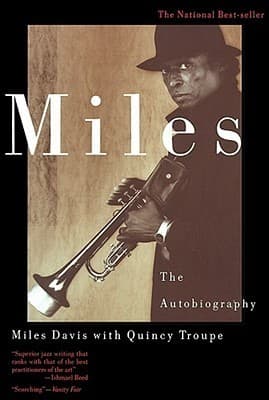
Book Review Summary: Miles: The Autobiography
Introduction
"Miles: The Autobiography" by Miles Davis is a captivating and candid account of the life and career of one of the most influential musicians of the 20th century. This book holds nothing back, as Davis speaks openly and frankly about his experiences, struggles, and achievements. From his early years in St. Louis to his groundbreaking contributions to jazz, Miles Davis' autobiography offers a unique perspective on the world of music and the challenges faced by artists in a rapidly changing society.
About Miles Davis
Miles Davis, born Miles Dewey Davis III, was an American jazz trumpeter, bandleader, and composer. He played a significant role in shaping the development of jazz from the 1940s to the 1990s. Davis was known for his innovative style and his ability to push boundaries, leading him to be considered one of the most important musicians of the 20th century. His impact on jazz extends beyond his own music, as he influenced countless other musicians and helped shape the genre's evolution.
Analysis of Views
-
Honesty and Authenticity: Readers praise the book for its raw honesty and authenticity. Miles Davis' candid approach to discussing his life, struggles, and experiences resonates with readers, allowing them to gain a deeper understanding of the man behind the music.
-
Insight into Jazz History: The book offers a fascinating look into jazz history, showcasing Miles Davis' contribution to the genre. Readers appreciate the insights provided by Davis into the evolution of jazz and his relationships with other influential musicians during this time.
-
Portraits of Legends: The book features portraits of some of the most significant figures in jazz history, including Charlie Parker, Dizzy Gillespie, Thelonious Monk, John Coltrane, and many others. Readers find these portraits engaging and enjoy learning about the personalities behind these legendary musicians.
-
Duality of Artistry: Miles Davis' autobiography explores the duality of his artistry, portraying both his creative genius and his struggles with addiction and personal relationships. Readers appreciate the complex portrayal of this side of Davis' life and find it relatable to their own experiences.
-
Timely Relevance: The book addresses issues of racism and cultural appropriation within the music industry, making it relevant to contemporary discussions on these topics. Readers appreciate the timely relevance of these themes and find them thought-provoking.
Reasons for Recommendation
-
Honesty and Authenticity: The book's raw honesty and authenticity make it a compelling read for those interested in understanding Miles Davis' life and career. The candid portrayal of his struggles and experiences provides readers with a unique perspective on this influential musician.
-
Insight into Jazz History: For those interested in jazz history, "Miles: The Autobiography" offers valuable insights into the evolution of the genre and the impact of Miles Davis on its development. The portraits of other influential musicians add depth to this historical context.
-
Portraits of Legends: The book features portraits of legendary musicians that offer readers a glimpse into their personalities and contributions to jazz history. These portraits provide a fascinating perspective on the lives and careers of these influential artists.
-
Timely Relevance: The book's exploration of racism and cultural appropriation within the music industry makes it relevant to contemporary discussions on these topics. Readers appreciate the timely relevance of these themes and find them thought-provoking.
Reasons for Not Recommendation
-
Limited Focus on Music: Some readers feel that the book focuses too much on Miles Davis' personal life and struggles, leaving them wanting more insight into his creative process and the music itself. They feel that the book could have delved deeper into his artistry and contributions to jazz.
-
Limited Literary Merit: Some readers find the language used in the book off-putting, particularly the frequent use of profanity. They feel that this detracts from the overall literary quality of the book and may not appeal to those who prefer more refined writing styles.
Conclusion
"Miles: The Autobiography" by Miles Davis offers a candid and authentic account of one of the most influential musicians of the 20th century. Through its exploration of jazz history, portraits of legendary musicians, and candid discussions on personal struggles, this book provides readers with a unique perspective on Miles Davis' life and career. While some readers feel that it could have delved deeper into his music or had a higher literary quality, others appreciate its honesty and relevance to contemporary discussions on racism and cultural appropriation within the music industry. Overall, "Miles: The Autobiography" is a compelling read for those interested in understanding this iconic musician and his impact on jazz history.